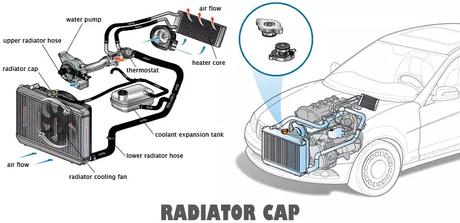Leaking Radiator Cap
The radiator cap plays a crucial role in maintaining pressure within the engine cooling system. Its primary function is to increase the boiling point of the coolant, preventing premature boiling. However, if the radiator cap is leaking and fails to seal properly, the boiling point of the coolant drops significantly.
Consequently, the engine and coolant may only be semi-hot, yet the radiator begins to boil over. To diagnose this issue, inspect the radiator cap when the engine is cold. Look for cracks in the rubber part on the cap's underside. Ensure a snug fit when screwing the cap back on, with no signs of looseness.
If any irregularities are observed, replacing the radiator cap might resolve the boil-over problem. A secure and properly functioning cap is essential to maintaining the required pressure in the cooling system.
Wrong Anti-freeze/Water Ratio
The anti-freeze/water ratio in the radiator is critical for both freezing and boil-over protection. Typically, a 50/50 mix of anti-freeze and water is sufficient for optimal performance. Anti-freeze not only prevents freezing in cold temperatures but also elevates the boiling point of water.However, an incorrect ratio, such as insufficient anti-freeze and excessive water, can cause the coolant to boil at a lower temperature. This results in the radiator boiling over even when the engine is only semi-hot.
Remedy
Inspect and Replace the Radiator Cap:
Begin by examining the radiator cap when the engine is cold. If cracks or defects are identified, replace the cap with a new one. Ensure a tight seal to maintain the required pressure in the cooling system.Adjust Anti-freeze/Water Ratio
If the radiator cap replacement does not resolve the issue, focus on the anti-freeze/water ratio. Drain the old coolant by backflushing the entire cooling system. Simply opening the radiator valve may not effectively remove all the old coolant. After flushing, refill the system with a proper 50/50 mixture of water and antifreeze.A boiling radiator when the engine is only semi-hot can be attributed to a leaking radiator cap or an incorrect anti-freeze/water ratio. Regular inspection and maintenance are crucial to prevent these issues. By addressing these issues promptly and accurately, you can ensure the proper functioning of your engine cooling system, preventing overheating and potential damage to your vehicle.
